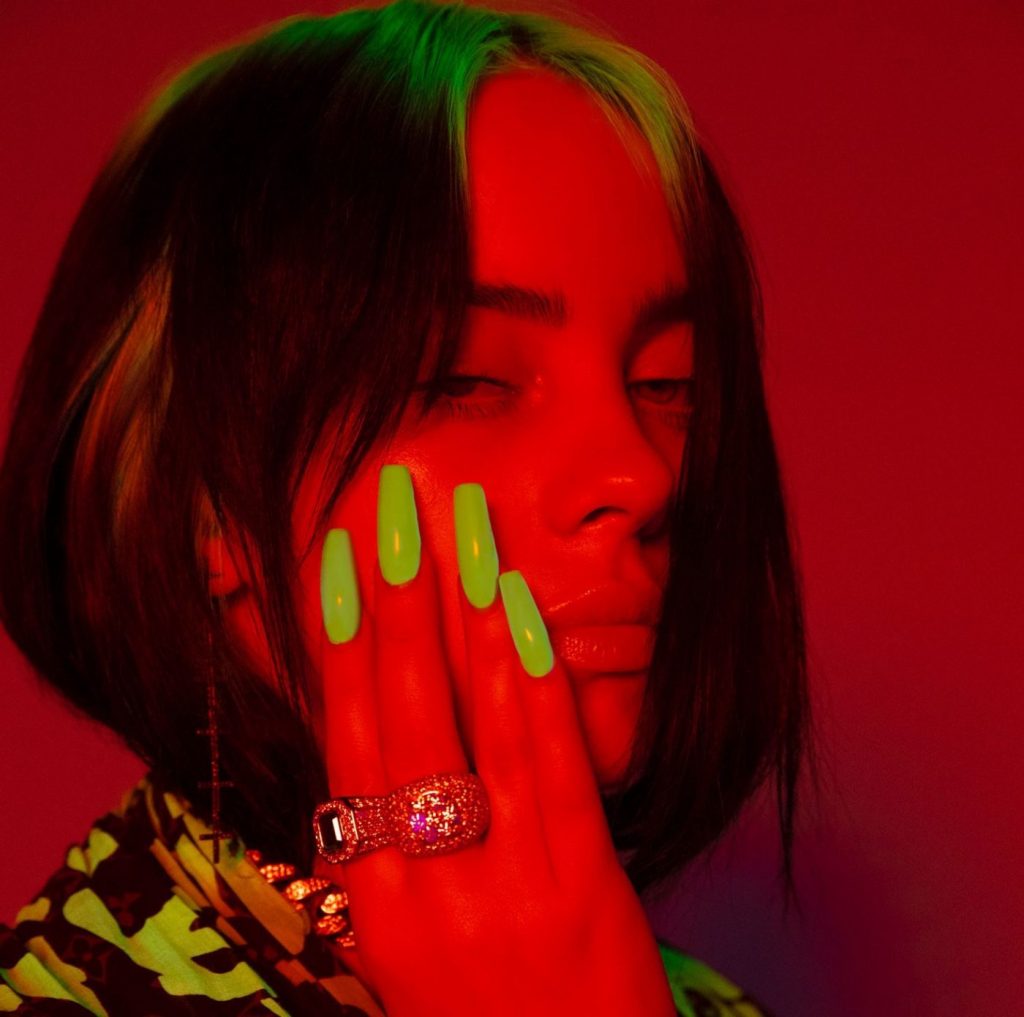 Billie Eilish is known for defying the constraints of any one genre, sliding in and through the the branches of pop music. It can be difficult to pinpoint what genre Eilish prefers due to the range of sound from one song to the next, making the originality of her sound what separates her from the rest. One could argue that her loyalty to such an independent style constitutes the likeness of a darker alternative category of music. Over time, her music has transformed starting from her Indie pop hit single “ocean eyes” to her staple grungy Indietronica vibe within her album “WHEN WE ALL FALL ASLEEP, WHERE DO WE GO?”; Perhaps the embodiment of her range can be best understood in the contrast to her song “you should see me in a crowd“. Her consistency in using a range of basses and electric aspects creates a heavy aura around her music, where each song challenges the limits of the alternative, pop, and electronic standard.
Billie Eilish is known for defying the constraints of any one genre, sliding in and through the the branches of pop music. It can be difficult to pinpoint what genre Eilish prefers due to the range of sound from one song to the next, making the originality of her sound what separates her from the rest. One could argue that her loyalty to such an independent style constitutes the likeness of a darker alternative category of music. Over time, her music has transformed starting from her Indie pop hit single “ocean eyes” to her staple grungy Indietronica vibe within her album “WHEN WE ALL FALL ASLEEP, WHERE DO WE GO?”; Perhaps the embodiment of her range can be best understood in the contrast to her song “you should see me in a crowd“. Her consistency in using a range of basses and electric aspects creates a heavy aura around her music, where each song challenges the limits of the alternative, pop, and electronic standard.
Billie Eilish’s single, “everything i wanted” was quick to reach the top of the charts shortly after its release in early November. The track falls into the Pop genre on the basis of the following criteria: “Songs that become hits almost always share certain features that are sometimes called the pop-music formula: They have a good rhythm, a catchy melody, and are easy to remember and sing along to. They usually have a chorus that’s repeated several times and two or more verses”. Most often, pop music appeals to the widest variety of audience possible. With mental health emerging into mainstream culture, using the skeleton of the pop genre in “everything i wanted” is not only a testimony to Eilish’s style, but also works parallel to endorsing dialogue about depression and anxiety to a broad range of listeners. As stated in this article, pop music borrows and sprinkles influences from other genres to create something original yet likable across a widespread set of listeners. “everything i wanted” lacks elements of rock and roll and falls under the category of the niche genre Ambient Pop, a branch of alternative pop that combines the conventional pop structure with soothing electronic pieces. The subtle beats and abundance of echo throughout the song creates a blanket of House that fuses really nicely to the dreamy texture of the song. In contrast to other Pop hits touching on the subject of mental health, Eilish has a more sentimental yet uplifting element to the song. As the narrative expressed throughout the lyrics offers a personal and raw look at Eilish’s own mental health struggles, it’s characteristics as a pop song help push boundaries of mental health as being a normal subject of conversation. Eilish’s choice of duality between the pop genre and sound of the song versus the overarching message of stabilizing and normalizing mental health as an important part of human well-being helps reach a large audience; allowing for this goal to be achieved.
An article by Vox Magazine adds an interesting point about Eilish’s rise to stardom as a pop music sensation; as the first female millennial pop star to rely on independent platforms rather than a history of childhood acting or relation to a specific TV network, Eilish’s career kickstarted on SoundCloud. As the article goes on to say, pop music sensations as a byproduct of SoundCloud is a rarity, usually pathing the way for hip-hop artists like xxxtentacion and Juice WRLD. This goes to show how Eilish is challenging the pop genre from the inside, out.
Listen to this Vox podcast segment for a more in depth look at how Billie Eilish is challenging the pop genre.
Leave a Reply